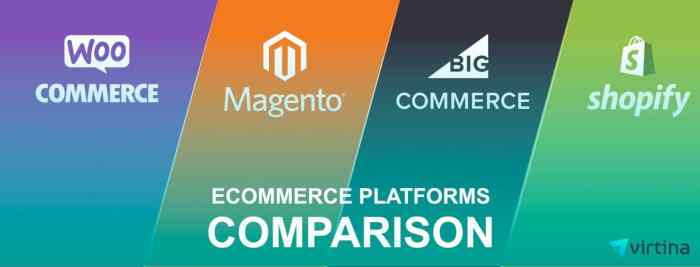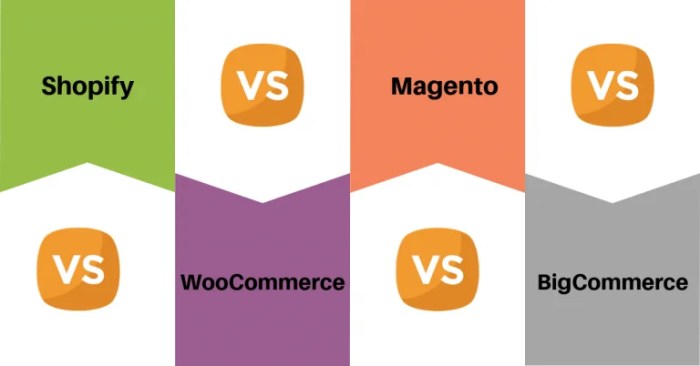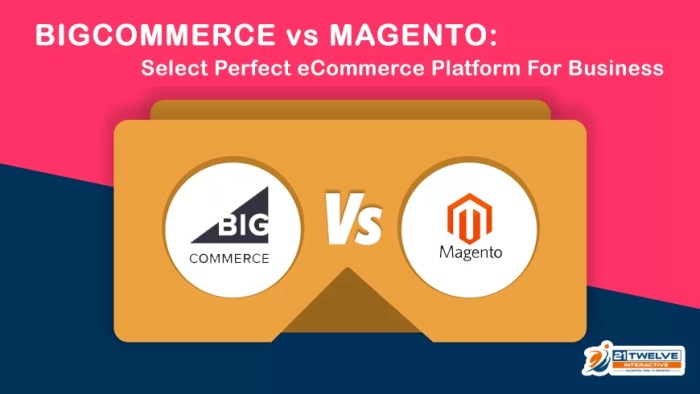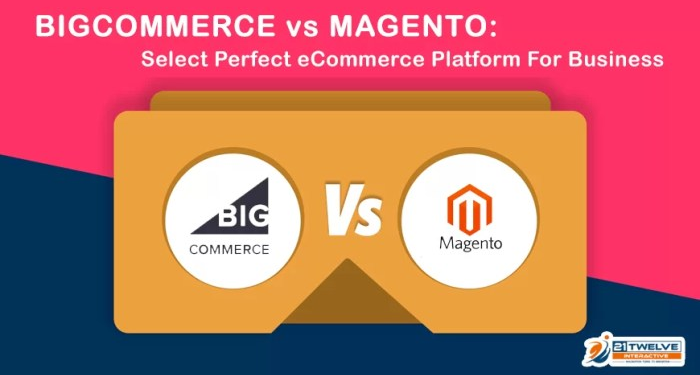When it comes to choosing between Magento and BigCommerce for your business, the decision can make a significant impact. Dive into this comparison to discover which platform aligns best with your business needs.
The following paragraphs will provide a detailed breakdown of key aspects to consider when selecting between Magento and BigCommerce.
Introduction to Magento and BigCommerce
Magento and BigCommerce are both popular e-commerce platforms that offer a range of features to help businesses create and manage online stores. Magento is an open-source platform that is highly customizable and scalable, making it suitable for larger businesses with complex requirements.
On the other hand, BigCommerce is a hosted platform that is known for its user-friendly interface and built-in features, making it a great choice for smaller businesses or those looking for a more straightforward solution.
Key Features of Magento
- Open-source platform
- Highly customizable
- Scalable for large businesses
- Advanced marketing and capabilities
- Robust community support
Key Features of BigCommerce
- Hosted platform
- User-friendly interface
- Built-in features like payment gateways and shipping options
- Responsive design templates
- 24/7 customer support
Target Audience for Magento versus BigCommerce
Magento is best suited for larger businesses that require a high level of customization and scalability. It is ideal for companies with complex product catalogs, multiple stores, or specific integration needs. On the other hand, BigCommerce is a great choice for smaller businesses or startups that are looking for an easy-to-use platform with built-in features and support.
It is also suitable for businesses that want to quickly set up an online store without the need for technical expertise.
Pricing and Cost Comparison

When choosing between Magento and BigCommerce, pricing is a crucial factor to consider. Let's break down the pricing tiers and features offered by each platform to help you make an informed decision based on your business needs.
Magento Pricing Tiers
| Magento Edition | Pricing | Features |
|---|---|---|
| Magento Open Source | Free | Basic features for small businesses |
| Magento Commerce | Starting at $22,000/year | Advanced features, support, and customization options |
BigCommerce Pricing Tiers
| BigCommerce Plan | Pricing | Features |
|---|---|---|
| Standard | $29.95/month | Basic features suitable for small businesses |
| Plus | $79.95/month | Additional features like abandoned cart recovery and customer groups |
Magento Commerce is more expensive than BigCommerce, especially for larger businesses that require advanced features and customization options. On the other hand, BigCommerce offers more affordable options for small to medium-sized businesses with its tiered pricing structure. Consider your business size and specific needs when evaluating the cost implications of each platform.
Customization and Flexibility
Customization and flexibility are crucial aspects when choosing an eCommerce platform for your business. Let's compare the level of customization options available on Magento and BigCommerce, along with examples of how businesses can tailor their online stores on each platform.
Level of Customization Options
- Magento: Magento offers extensive customization options, allowing businesses to have full control over the design and functionality of their online stores. From customizing themes to adding new features through extensions, Magento provides a highly flexible platform for businesses with unique requirements.
- BigCommerce: While BigCommerce also offers a good level of customization, it may not be as extensive as Magento. Businesses can still customize their online stores by choosing from a variety of themes and integrating apps to add functionalities, but the flexibility might be slightly limited compared to Magento.
Examples of Tailoring Online Stores
- Magento: A business selling customizable products, such as personalized gifts, can use Magento to create a unique user experience where customers can easily customize their items before purchase.
- BigCommerce: A small boutique clothing store can tailor their online store on BigCommerce by choosing a theme that reflects their brand identity and integrating features like size guides and customer reviews to enhance the shopping experience.
Flexibility in Design and Functionality
- Magento: With its open-source nature, Magento allows for high levels of customization in both design and functionality. Businesses can create completely unique online stores tailored to their specific needs and branding requirements.
- BigCommerce: While BigCommerce offers a user-friendly interface for making design changes, the platform may have some limitations in terms of deep customization. However, businesses can still achieve a professional and visually appealing online store with the available design options.
Scalability and Performance
When it comes to growing a business, scalability and performance are crucial factors to consider in choosing the right e-commerce platform. Let's delve into how Magento and BigCommerce handle these aspects as businesses expand.
Scalability
- Magento: Known for its scalability, Magento offers a robust platform that can easily accommodate growing businesses. With its open-source nature, Magento allows for extensive customization and integration of third-party extensions to support business growth.
- BigCommerce: While BigCommerce is a cloud-based solution, it also provides scalability options for businesses looking to expand. The platform offers various plans and features to help businesses scale their operations efficiently.
Performance Metrics
- Page Load Speed:
- Magento: Due to its flexibility and customization options, Magento may require optimization to achieve optimal page load speeds. However, with proper configuration and caching mechanisms, Magento can deliver fast loading times.
- BigCommerce: With its cloud-based infrastructure, BigCommerce boasts impressive page load speeds out of the box. The platform is optimized for performance, ensuring a seamless shopping experience for customers.
- Uptime:
- Magento: Uptime for Magento stores largely depends on the hosting provider and server configuration. With the right hosting environment and maintenance practices, Magento can achieve high uptime percentages.
- BigCommerce: As a cloud-based platform, BigCommerce offers reliable uptime with its infrastructure managed by the provider. Businesses can expect minimal downtime and consistent availability of their online stores.
Support for Growing Businesses
- Magento: With its extensive customization options and scalability features, Magento is well-equipped to support growing businesses. The platform can handle increased product listings, higher traffic volumes, and complex business requirements as businesses expand.
- BigCommerce: BigCommerce provides scalable plans and features that cater to businesses of all sizes. The platform offers tools for inventory management, marketing, and analytics to help businesses grow and succeed in the e-commerce landscape.
Integrations and Extensions

When it comes to building a successful online store, integrating with third-party tools and utilizing extensions can greatly enhance the functionality and user experience. Both Magento and BigCommerce offer a wide range of popular integrations and extensions to help businesses customize and optimize their online stores.
Magento Integrations and Extensions
Magento has a vast marketplace of extensions and integrations that cover various aspects of e-commerce, such as payment gateways, shipping solutions, marketing tools, and customer service. Some popular integrations and extensions for Magento include:
- Magento Marketplace: An official platform where users can find and purchase extensions for their Magento store.
- OneStepCheckout: Streamlines the checkout process to reduce cart abandonment rates.
- Yotpo: Helps generate and display customer reviews to build trust and increase sales.
- Zendesk: Integrates customer support features directly into the Magento store.
BigCommerce Integrations and Extensions
BigCommerce also offers a variety of integrations and extensions to enhance the functionality of online stores. Some popular options include:
- BigCommerce App Store: A marketplace for finding and installing apps to improve store performance.
- ShipStation: Simplifies order fulfillment and shipping processes for online retailers.
- Mailchimp: Enables email marketing campaigns and automation to engage with customers.
- QuickBooks Online: Integrates accounting and financial management tools for seamless operations.
Integrating these third-party tools with Magento or BigCommerce is relatively straightforward, as both platforms have robust APIs and developer resources to facilitate the process. This ease of integration allows businesses to expand the functionality of their online stores without extensive technical knowledge, making it convenient for users to set up and manage their e-commerce operations effectively.
Support and Resources

When it comes to running an online store, having access to reliable support and resources can make a huge difference in the success of your business. Let's take a closer look at the support options provided by Magento and BigCommerce, and compare the availability and quality of resources offered by each platform.
Magento Support and Resources
Magento offers a range of support options for its users. This includes a comprehensive documentation library, community forums, and direct customer support through phone, email, and live chat. The documentation provided by Magento is detailed and well-organized, making it easy for users to find answers to their questions.
The community forums are active and vibrant, allowing users to connect with other Magento merchants and developers for advice and support. In terms of customer support, Magento offers different levels of support depending on the plan you choose, with higher-tier plans offering more personalized support options.
BigCommerce Support and Resources
Similarly, BigCommerce also provides a variety of support options for its users. Users have access to an extensive knowledge base, community forums, and customer support via phone, email, and live chat. The knowledge base provided by BigCommerce is well-maintained and covers a wide range of topics, making it easy for users to troubleshoot issues on their own.
The community forums are active and engaging, allowing users to learn from each other and share best practices. Customer support from BigCommerce is known for being responsive and helpful, with quick turnaround times on support tickets.Overall, both Magento and BigCommerce offer robust support and resources for their users.
The choice between the two platforms ultimately comes down to your specific business needs and preferences in terms of support options and resources.
Final Thoughts
In conclusion, understanding the differences and strengths of Magento and BigCommerce is crucial for making an informed decision. Choose wisely to ensure your online business thrives in the competitive digital landscape.
Q&A
Which platform is more suitable for a small business?
BigCommerce is often considered more user-friendly for small businesses due to its simplicity in set up and management.
Can I migrate from Magento to BigCommerce easily?
Migrating from Magento to BigCommerce involves some complexity, especially in transferring data and customizations. It's recommended to seek professional help for a seamless transition.
Do both platforms offer mobile-responsive designs?
Yes, both Magento and BigCommerce provide mobile-responsive design options to ensure optimal viewing experience on smartphones and tablets.
Which platform has better customer support?
BigCommerce is known for its excellent customer support, offering various channels for assistance and quick response times.
Are there limitations to the number of products I can list on each platform?
Magento typically handles larger product catalogs better, making it suitable for businesses with extensive inventories.











